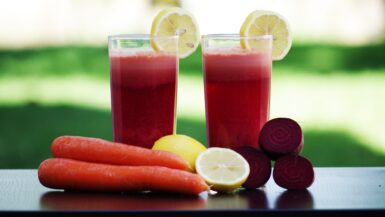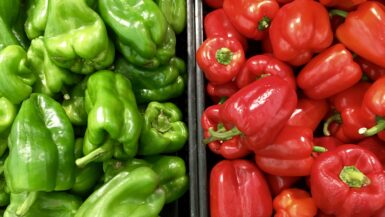In today’s world, where the food industry is filled with chemicals, pesticides, and other harmful substances, the importance of eating organic food for a healthy diet is paramount. Organic food is grown without the use of synthetic fertilizers, pesticides, and other harmful chemicals, making it a healthier and safer option for consumption. Eating organic food not only benefits our health but also supports sustainable farming practices and helps to reduce the impact of farming on the environment. In this article, we will delve into the importance of eating organic food for a healthy diet and explore the benefits of consuming organic produce.
What is organic food and how is it different from conventional food?
Organic food is grown and processed without the use of synthetic pesticides, fertilizers, or genetically modified organisms (GMOs). Organic farmers use natural methods such as crop rotation, composting, and biological pest control to maintain the health of their soil and crops. Organic livestock are raised without antibiotics or growth hormones and have access to outdoor grazing areas.
Conventional food, on the other hand, is grown with the use of synthetic pesticides and fertilizers, GMOs, and often treated with antibiotics and growth hormones. The use of these chemicals and practices can have negative effects on the environment, human health, and animal welfare.
Organic farming also emphasizes sustainability and the conservation of natural resources. Organic farmers work to decrease their carbon footprint by reducing their use of fossil fuels and employing practices that conserve water and soil. In contrast, conventional farming can be very resource-intensive and can contribute to soil erosion, water pollution, and greenhouse gas emissions.
Overall, organic farming and food production represent a more natural and holistic approach to food production that takes into account the health of the soil, the environment, and our own health.
The benefits of eating organic food for your health
Eating organic food can have numerous benefits for your health. Organic produce is often fresher and contains higher levels of nutrients such as vitamins, minerals, and antioxidants. This is because organic farming practices focus on soil health and nutrient density, resulting in healthier and more nutrient-rich crops.
Organic food is also free from synthetic pesticides and fertilizers, which can be harmful to human health. Pesticides have been linked to a variety of health problems, including cancer, neurological disorders, and reproductive issues. By choosing organic, you can reduce your exposure to these harmful chemicals and protect your health.
Additionally, organic meat and dairy products are often higher in beneficial nutrients such as omega-3 fatty acids and have lower levels of harmful substances such as saturated fats and antibiotics. This is because organic livestock are raised in a more natural and humane environment, with access to outdoor grazing areas and a diet free from antibiotics and growth hormones.
Overall, eating organic food can provide numerous health benefits, including higher nutrient levels, reduced exposure to harmful chemicals, and improved animal welfare. While organic food may be more expensive, the long-term health benefits are well worth the investment.
The impact of pesticides and chemicals on conventional food
Conventional food is often treated with synthetic pesticides and fertilizers to increase crop yields and prevent pests. However, these chemicals can have negative impacts on both human health and the environment.
Pesticides can leave residues on crops that are then consumed by humans. These residues have been linked to a variety of health problems, including cancer, neurological disorders, and reproductive issues. Children are particularly vulnerable to the harmful effects of pesticides, as their developing bodies are more susceptible to toxins.
In addition to the health risks, pesticides can also have negative impacts on the environment. These chemicals can contaminate soil and water, harm wildlife, and contribute to the decline of pollinators such as bees.
Chemical fertilizers used in conventional farming can also have negative environmental impacts. These fertilizers can contribute to soil erosion, water pollution, and the release of greenhouse gases. Organic farming practices, on the other hand, focus on building healthy soil through natural methods such as crop rotation and composting, which can improve soil health and reduce environmental impacts.
Overall, the use of pesticides and chemicals in conventional farming can have negative impacts on both human health and the environment. By choosing organic food, you can reduce your exposure to these harmful chemicals and support more sustainable and environmentally friendly farming practices.
The environmental benefits of organic farming
Organic farming practices focus on sustainability and the conservation of natural resources, making it a more environmentally friendly approach to food production. By choosing organic food, you can support farming practices that prioritize the health of the planet.
Organic farming uses natural methods such as crop rotation, composting, and biological pest control to maintain soil health and crop productivity. This can lead to increased soil fertility, reduced erosion, and improved water quality.
Organic farming also emphasizes the use of renewable resources and the conservation of non-renewable resources such as fossil fuels. Organic farmers use techniques such as cover cropping and reduced tillage to reduce their use of fossil fuels and decrease their carbon footprint.
In addition, organic farming practices can support biodiversity and the health of ecosystems. By avoiding the use of synthetic pesticides and fertilizers, organic farming can help to protect pollinators such as bees, birds, and butterflies, which are essential for maintaining healthy ecosystems.
Overall, organic farming represents a more holistic and sustainable approach to food production that takes into account the health of the planet. By choosing organic food, you can support farming practices that prioritize environmental conservation and sustainability.
The cost of organic food and how to make it more affordable
One of the main concerns for many people when it comes to choosing organic food is the cost. Organic food can be more expensive than conventional food, which can make it difficult for some people to incorporate into their diets. However, there are ways to make organic food more affordable.
One way to make organic food more affordable is to buy in bulk. Buying larger quantities of organic products can often be more cost-effective than buying smaller quantities. This is especially true for non-perishable items such as grains, beans, and nuts.
Another way to save money on organic food is to shop at local farmers’ markets or participate in a community-supported agriculture (CSA) program. These options often provide fresh, locally grown produce at a lower cost than grocery store prices.
It’s important to prioritize which organic products to buy. Some fruits and vegetables are more heavily sprayed with pesticides than others, so it can be helpful to prioritize buying organic versions of these items. The Environmental Working Group produces an annual list of the “Dirty Dozen” and “Clean Fifteen” fruits and vegetables, which can be a helpful guide when deciding which items to buy organic.
Finally, consider growing your own organic produce at home. This can be a cost-effective way to incorporate more organic food into your diet, and can also be a fun and rewarding hobby.
By being mindful of your purchasing habits and prioritizing certain items, you can make organic food more affordable and accessible.
Tips for incorporating more organic food into your diet
Incorporating more organic food into your diet can be a great way to improve your health and support sustainable farming practices. Here are some tips for making the switch to organic:
1. Prioritize certain items: As mentioned earlier, some fruits and vegetables are more heavily sprayed with pesticides than others. Prioritizing buying organic versions of these items can help reduce your exposure to harmful chemicals.
2. Start small: Switching to an all-organic diet can be overwhelming and expensive. Start by incorporating one or two organic items into your diet each week, and gradually increase from there.
3. Buy in season: Organic produce can be more affordable when it’s in season. Look for local farmers’ markets or CSA programs to find fresh, locally grown produce at a lower cost.
4. Cook at home: Cooking at home can be a cost-effective way to incorporate more organic food into your diet. By cooking with fresh ingredients, you can control the quality of the food you’re eating and reduce your exposure to harmful chemicals.
5. Consider frozen organic produce: Frozen organic produce can be a more affordable alternative to fresh organic produce. It’s also a great option for items that aren’t in season or that are difficult to find.
6. Read food labels: Look for products that are certified organic by a reputable organization. This ensures that the products meet strict standards for organic production.
Incorporating more organic food into your diet doesn’t have to be difficult or expensive. By being mindful of your purchasing habits and prioritizing certain items, you can make the switch to organic and improve your health while supporting sustainable farming practices.
The importance of reading food labels and understanding food certifications
When it comes to choosing organic food, it’s important to read food labels and understand food certifications. This can help ensure that the products you’re buying meet strict organic standards and are free from harmful chemicals.
Look for products that are certified organic by a reputable organization such as the USDA (United States Department of Agriculture) or the Soil Association. These certifications ensure that the products have been produced and processed according to strict organic standards, and have been verified by a third-party organization.
It’s also important to read food labels carefully to determine which products are truly organic. Look for products that have the “certified organic” label, and check the ingredient list to ensure that all ingredients are organic.
In addition to organic certifications, there are other certifications and labels to look for when choosing food products. For example, the Non-GMO Project Verified label indicates that a product has been verified to be free from genetically modified organisms (GMOs).
By reading food labels and understanding food certifications, you can make informed choices about the products you’re buying and ensure that you’re getting the highest quality organic food possible.
The Role of Organic Food in Disease Prevention
Organic food has been found to play a crucial role in disease prevention. Several studies have shown that organic food contains higher levels of essential nutrients and antioxidants that help to boost the immune system and prevent chronic diseases.
Organic fruits and vegetables are grown without the use of synthetic pesticides and fertilizers. These chemicals have been linked to various health problems, including cancer, reproductive problems, and developmental issues in children. By consuming organic food, you reduce your exposure to these harmful chemicals, which can have a significant impact on your health.
Organic meat and dairy products come from animals that are raised without the use of antibiotics and growth hormones. These substances have been linked to antibiotic resistance and may increase the risk of cancer and other diseases. By choosing organic meat and dairy products, you can reduce your exposure to these harmful substances and improve your overall health.
In addition to being free from harmful chemicals, organic food is also rich in nutrients that are essential for good health. Organic fruits and vegetables contain higher levels of vitamin C, iron, and other essential nutrients that are important for a healthy immune system. Organic meat and dairy products are also rich in essential nutrients that are important for optimal health.
Overall, incorporating organic food into your diet can help to reduce your risk of chronic diseases, improve your overall health, and protect you from harmful chemicals and substances. While organic food may be more expensive than conventional food, the benefits are well worth the cost. By choosing organic food, you are investing in your health and well-being, and that is something that cannot be measured in dollars and cents.
The Impact of Organic Food on Animal Welfare
Organic farming practices prioritize animal welfare and aim to provide a natural and healthy environment for the animals. Organic livestock is raised without the use of growth hormones or antibiotics, and they are given access to the outdoors, fresh air, and natural feed. This ensures that the animals are healthy and happy, and their meat and dairy products are of higher quality.
Conventional farming practices often keep animals in confined spaces, which can lead to stress and disease. They are also given growth hormones and antibiotics to increase their size and prevent disease outbreaks. These practices can have a negative impact on the animals’ health and welfare, as well as the quality of their meat and dairy products.
Organic farming practices help to create a more sustainable and humane food system. By choosing organic food, you are supporting farmers who prioritize animal welfare, and you are helping to create a system that is better for the animals, the environment, and your health.
In addition, organic farming practices also help to promote biodiversity and preserve natural habitats. Organic farms use natural methods to control pests and diseases, which helps to protect the soil, water, and wildlife. This creates a healthier and more sustainable ecosystem, which benefits both the animals and the environment.
In conclusion, choosing organic food is not only beneficial for your health, but it also supports a more sustainable and humane food system. By prioritizing animal welfare and promoting biodiversity, organic farming practices help to create a healthier and more sustainable ecosystem that benefits everyone.





Leave a reply